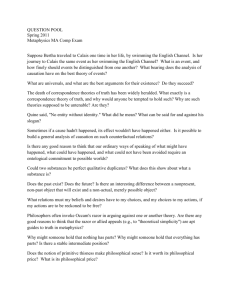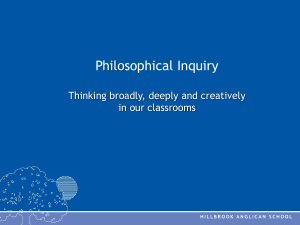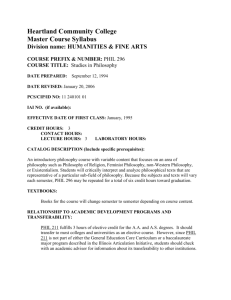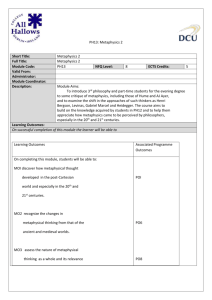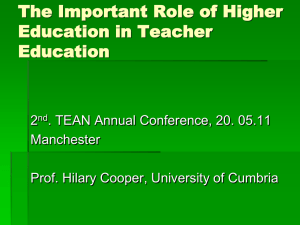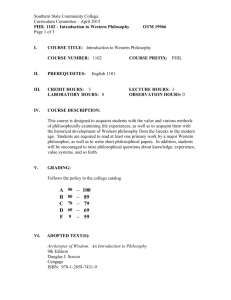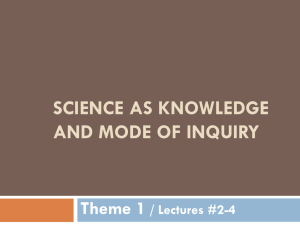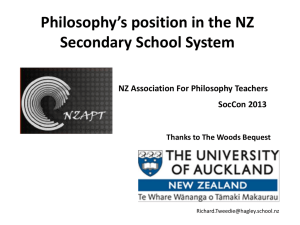HZB4U Comparison Chart - Ontario Philosophy Teachers` Association
advertisement
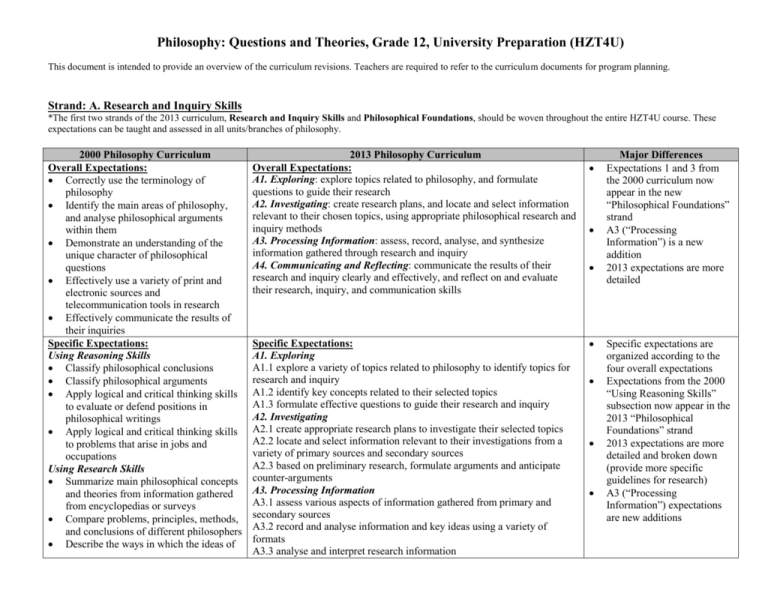
Philosophy: Questions and Theories, Grade 12, University Preparation (HZT4U) This document is intended to provide an overview of the curriculum revisions. Teachers are required to refer to the curriculum documents for program planning. Strand: A. Research and Inquiry Skills *The first two strands of the 2013 curriculum, Research and Inquiry Skills and Philosophical Foundations, should be woven throughout the entire HZT4U course. These expectations can be taught and assessed in all units/branches of philosophy. 2000 Philosophy Curriculum Overall Expectations: Correctly use the terminology of philosophy Identify the main areas of philosophy, and analyse philosophical arguments within them Demonstrate an understanding of the unique character of philosophical questions Effectively use a variety of print and electronic sources and telecommunication tools in research Effectively communicate the results of their inquiries Specific Expectations: Using Reasoning Skills Classify philosophical conclusions Classify philosophical arguments Apply logical and critical thinking skills to evaluate or defend positions in philosophical writings Apply logical and critical thinking skills to problems that arise in jobs and occupations Using Research Skills Summarize main philosophical concepts and theories from information gathered from encyclopedias or surveys Compare problems, principles, methods, and conclusions of different philosophers Describe the ways in which the ideas of 2013 Philosophy Curriculum Overall Expectations: A1. Exploring: explore topics related to philosophy, and formulate questions to guide their research A2. Investigating: create research plans, and locate and select information relevant to their chosen topics, using appropriate philosophical research and inquiry methods A3. Processing Information: assess, record, analyse, and synthesize information gathered through research and inquiry A4. Communicating and Reflecting: communicate the results of their research and inquiry clearly and effectively, and reflect on and evaluate their research, inquiry, and communication skills Specific Expectations: A1. Exploring A1.1 explore a variety of topics related to philosophy to identify topics for research and inquiry A1.2 identify key concepts related to their selected topics A1.3 formulate effective questions to guide their research and inquiry A2. Investigating A2.1 create appropriate research plans to investigate their selected topics A2.2 locate and select information relevant to their investigations from a variety of primary sources and secondary sources A2.3 based on preliminary research, formulate arguments and anticipate counter-arguments A3. Processing Information A3.1 assess various aspects of information gathered from primary and secondary sources A3.2 record and analyse information and key ideas using a variety of formats A3.3 analyse and interpret research information Major Differences Expectations 1 and 3 from the 2000 curriculum now appear in the new “Philosophical Foundations” strand A3 (“Processing Information”) is a new addition 2013 expectations are more detailed Specific expectations are organized according to the four overall expectations Expectations from the 2000 “Using Reasoning Skills” subsection now appear in the 2013 “Philosophical Foundations” strand 2013 expectations are more detailed and broken down (provide more specific guidelines for research) A3 (“Processing Information”) expectations are new additions philosophers have influenced subsequent philosophers Using Communication Skills Clearly explain their own views in philosophical discussions in class and in other types of exchanges Clearly explain their views and display their use of philosophical reasoning skills in written papers, using accepted forms of documentation as required A3.4 demonstrate academic honesty by documenting the sources of all information gathered through research A3.5 synthesize findings and formulate conclusions A4. Communicating and Reflecting A4.1 use an appropriate format to communicate the results of research and inquiry effectively for a specific purpose and audience A4.2 correctly use terms relating to their chosen topics A4.3 clearly communicate the results of their chosen inquiries and follow appropriate conventions for acknowledging sources A4.4 demonstrate an understanding of the general research process by reflecting on and evaluating their own research, inquiry, and communication skills Strand: B. Philosophical Foundations *The first two strands of the 2013 curriculum, Research and Inquiry Skills and Philosophical Foundations, should be woven throughout the entire HZT4U course. These expectations can be taught and assessed in all units/branches of philosophy. 2000 Philosophy Curriculum Overall Expectations: This is a new strand in the philosophy curriculum. Specific Expectations: This is a new strand in the philosophy curriculum. 2013 Philosophy Curriculum Overall Expectations: B1. The Nature of Philosophy: demonstrate an understanding of the main areas of philosophy, periods of philosophical development, and the differences between philosophy and other areas of inquiry B2. Philosophical Reasoning: demonstrate an understanding of philosophical reasoning and critical thinking skills, including skills required to identify and avoid common fallacies of reasoning, and demonstrate the ability to apply these skills in various contexts. Specific Expectations: B1. The Nature of Philosophy B1.1 explain the main areas of philosophy and identify some of the big questions that arise in each area B1.2 describe the main periods of philosophical development and the major philosophers identified with those periods B1.3 distinguish between philosophy and other areas in the social sciences and humanities B2. Philosophical Reasoning B2.1 demonstrate an understanding of the form and components of a philosophical argument, including how a philosophical argument differs from other communications, and identify these components when formulating and evaluating arguments B2.2 describe critical thinking skills and habits of mind that support philosophical reasoning, and demonstrate the ability to use them in various contexts B2.3 correctly use terminology related to logic when formulating and analyzing arguments B2.4 explain common fallacies of reasoning and identify them when formulating and analyzing arguments B2.5 explain how philosophical reasoning and critical thinking skills can be applied in everyday life, and demonstrate the ability to apply these skills in various contexts. Major Differences 2013 expectations draw from overall expectations 1-3 in the “Research and Inquiry Skills” strand of the 2000 curriculum The requirement to include elements of logic (fallacies of reasoning) is a new addition Many expectations are new additions (such as periods of philosophical development, metacognition on critical thinking skills, fallacies of reason, etc.) B2 specific expectations draw from the 2000 “Research and Inquiry” strand Strands: C, D, E, F, G and H (Philosophical Branches) *The overall and specific expectations for the various branches of philosophy in the 2013 HZT4U curriculum follow the same format and wording. Simply replace “C” with the assigned letter and “metaphysics” with the name of the desired branch. (Note: expectations from the different branches of philosophy in the 2000 curriculum vary in number and wording. Please refer to curriculum documents for specific wording of the 2000 curriculum.) Strand C. Metaphysics D. Ethics E. Epistemology F. Philosophy of Science G. Social and Political Philosophy H. Aesthetics 2000 Philosophy Curriculum Overall Expectations: Summarize the main questions, concepts, and theories of metaphysics Evaluate the strengths and weaknesses of responses to some of the main questions of metaphysics defended by some major philosophers and schools of philosophy, and defend their own responses Demonstrate the relevance of metaphysical questions and theories to everyday life Illustrate how metaphysical theories are presupposed in other subjects Specific Expectations: Demonstrate an understanding of some of the main questions in metaphysics Evaluate the positions of some of the major philosophers on some of the main metaphysical questions Formulate their own clear and cogent responses to some of the fundamental questions of metaphysics, and defend their responses in philosophical exchanges with others Explain, with reference to some classic texts, how different metaphysical theories about such questions as “Do Category and Weighting Core Topics: Cover at least two Supplementary Topics: Cover at least one 2013 Philosophy Curriculum Overall Expectations: C1. Understanding Metaphysics: demonstrates an understanding of the main questions in metaphysics, and of the positions of major philosophers and schools of philosophy with respect to some of these questions C2. Exploring Metaphysics: demonstrate an understanding of metaphysical theories, and evaluate responses to some of the main questions in metaphysics by major philosophers and schools of philosophy C3. Making Connections to Metaphysics: demonstrate an understanding of connections between metaphysics and other areas of philosophy, other subject areas, and various aspects of society, including everyday life C4. Philosophical Reasoning in Metaphysics: use philosophical reasoning skills to develop, communicate, and defend their own responses to metaphysical questions Specific Expectations: C1. Understanding Metaphysics C1.1 demonstrate an understanding of some of the main questions in metaphysics C1.2 summarize the positions of various major philosophers and schools of philosophy on some of the main questions in metaphysics C2. Exploring Metaphysics C2.1 explain different metaphysical theories with reference to some classic and contemporary texts C2.2 compare how different philosophers and/or schools of philosophy approach the same metaphysical questions/issues C2.3 evaluate the strengths and weaknesses of philosophical responses to some of the main questions in metaphysics C3. Making Connections to Metaphysics C3.1 demonstrate an understanding of the influence that ideas related to Major Differences 2013 expectations are more detailed and specific C3 (“Making Connections to Metaphysics”) is a combination of expectations 3-4 in the 2000 curriculum C4 (“Philosophical Reasoning in Metaphysics”) is a new addition 2013 expectations are broken down and include more specific details C1 and C2 expectations build upon expectations 1,2, and 4 of the 2000 curriculum C3 builds upon specific expectations 4 and 5 of the 2000 curriculum C4 expands upon the expectation 3 in the 2000 curriculum persons remain the same over time?” make differences in people’s attitudes to such practical issues as making promises, memory, and responsibility for past events Demonstrate an understanding of the influence that some metaphysical ideas about topics such as casualty, space and time, and the infinite have on other disciplines, such as physics and astronomy metaphysics have on their everyday life C3.2 explain ways in which metaphysics draws from and influences other areas of philosophy C3.3 describe forces that have helped shape the evolution of metaphysical thought over time, and analyse their impact C3.4 demonstrate an understanding of the influence of metaphysical ideas on other subject areas C4. Philosophical Reasoning in Metaphysics C4.1 formulate and explain, using philosophical reasoning skills, their own clear and cogent responses to some of the main questions in metaphysics C4.2 evaluate and defend, in philosophical exchanges with others, their own responses to some of the main questions in metaphysics, and anticipate and respond logically to counter-arguments C4.3 correctly use terminology related to metaphysics
